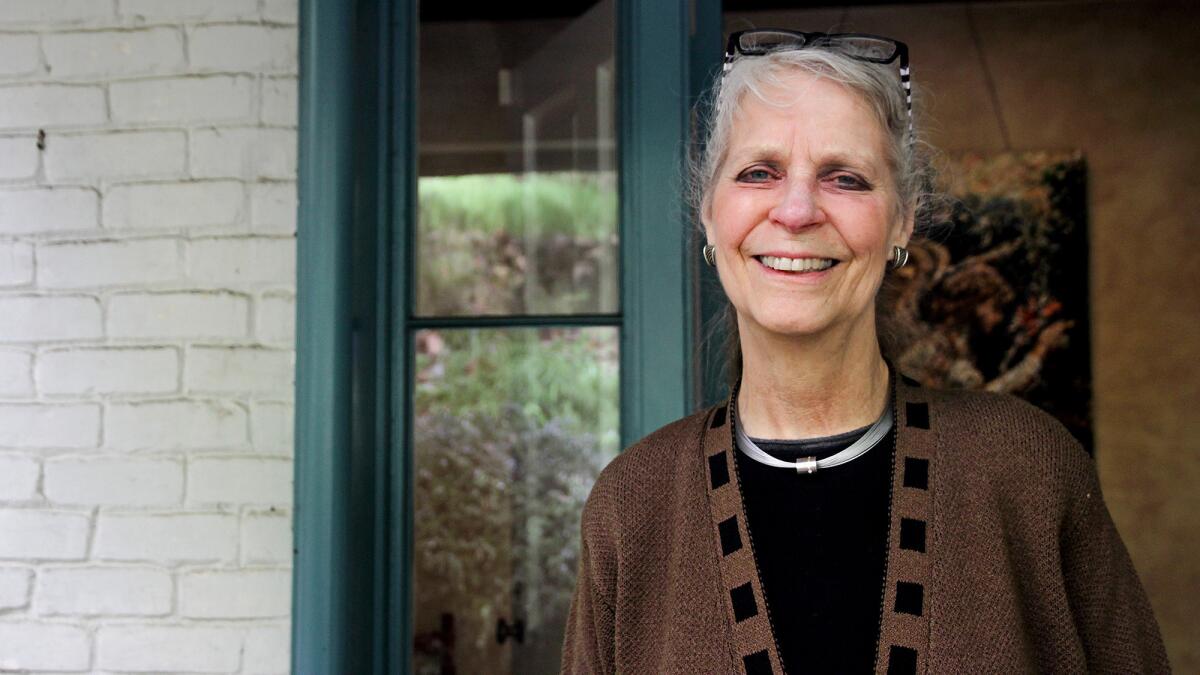Her brand helps others brand themselves: The design maven who helped name TiVo and Kindle

The gig: Karin Hibma, 65, is co-founder and principal of brand-strategy consulting firm Cronan, based in Berkeley, and is best known for coming up with the names for TiVo and Amazon’s Kindle. Cronan has done work for Apple, Levi Strauss, Estee Lauder and many others. Hibma and her team plumb a client’s history and values to home in on a “strategic identity” for a new product, a new company or to help focus a major change in corporate direction.
The power of enthusiasm: An art student in the early ’70s at the school now known as Cal State Sacramento, she picked three postings on a job wall for part-time work. The one she chose — a researcher for a commercial art studio — “changed my life.” There was heavy competition for the position. She figures she was chosen because “for other people, it was just a job. For me, it was an adventure. I’ve always been enthusiastic about things. I probably communicate that enthusiasm.”
Heading west: She soon moved to the Bay Area, following a young man she’d met in Sacramento who was designing rock ’n’ roll posters: Michael Cronan, whom she would marry. She introduced him to the graphic design community in San Francisco, which she found “very collaborative” compared with the cutthroat business surrounding the fine arts.
Can-do approach: Hibma launched her own business, Design Resource. She pulled together props, sets and research for advertisers, documentary filmmakers and others, raising eyebrows when she showed up at one shoot with a flatbed truck piled with wooden lanes taken from a bowling alley.
She was working for the producer of a Del Monte Foods commercial directed at “sports moms.” He needed a bowling lane. She knew that the Berkeley Bowl bowling center was being gutted to make room for the now-famous grocery store that still bears its name. She saved the bowling lanes from the junk pile. “I made my name with that can-do approach,” she said. Design Resource’s mission was “poorly defined,” she said, “but that meant I could adjust to what anybody needed.”
Learning from the best: That can-do reputation led to a project researching and writing a Chevron-funded traveling museum exhibit to showcase the creative process of American luminaries in the arts and sciences. She found herself interviewing the likes of Jonas Salk, John Cage, Merce Cunningham, Linus Pauling and Judy Chicago.
Collectively, they shared a trait she has consciously applied to her businesses ever since. “These people were so curious, so open about learning, so open to their process,” she said. When she interviewed Margaret Mead for the project, the groundbreaking anthropologist was intrigued, Hibma recalled, telling her, “ ‘I want to find out what you’re learning from those other people.’ ”
Joining forces: Hibma gave birth to the first of two sons in 1980 and closed Design Resource, while her husband opened Cronan Design, a graphic design studio in San Francisco. Some clients weren’t paying their bills; Hibma came in to collect. She ended up running the business side of the firm. “If any guy came in to run the business, everybody would say they were partners,” she said. Instead, she was “Michael’s wife.” She didn’t think much about it, but on reflection, she said, it illustrates the sexism of the times.
Cash is queen: She made sure the company always had cash to grow. While the firm accepted a bit of equity from some start-up customers, hard cash was the main form of currency. San Francisco and Silicon Valley are littered with small companies that took equity in lieu of cash and didn’t survive.
Contracts and therapy: Around 1985, Estee Lauder had launched plans for a retail chain for its Origin beauty products. The firm spent two years on creative work for the project — color schemes, designs, packaging. Estee Lauder canceled the project, but the contract Hibma had written prevented Cronan from using the firm’s work anywhere else, a hard lesson.
For future jobs, Hibma insisted that intellectual property stay with the firm. “I still believe contracts are a litany of the hurts each party has experienced,” she said. Sussing out what’s really at issue in defensive contract language, she said, usually results in a better deal for all parties.
Walking Man: After her second son arrived, Hibma started a catalog company with contemporary modern apparel for larger men under the brand Walking Man. Michael Cronan, who stood 6-foot-5, had trouble finding high-quality clothing. Enough others did too, and Walking Man become a small but profitable success. Along with Banana Republic, among others, Walking Man helped start the now-prolific business of niche clothing retailing by catalog and eventually online.
New identity: At Hibma’s suggestion and with some resistance from her husband, the design firm shifted into corporate branding and identity. Eventually the word “Design” was dropped from the company name. Customers came from many sectors, from the San Francisco Museum of Modern Art to the U.S. Postal Service to technology companies and banks. Signature work for the firm included not just the names but also the brand identities for TiVo and Amazon’s Kindle.
On her own: After her husband died from cancer in 2013, Hibma was left to run Cronan herself. She had learned a lot from Michael and had contributed plenty of original ideas. Still, she regrets she hadn’t taken the lead more often in client meetings, even as her husband grew more ill. “I had been the navigator in the front seat while he drove the car,” she said. Now, she’s driver and navigator both. She maintains a rotating roster of three to five clients, serves on two boards and as an advisor to five others and is writing a book, “Elegant Questions, Design Answers.”
She remains, she said, “insatiably curious and enthusiastic.”
Twitter: @russ1mitchell







